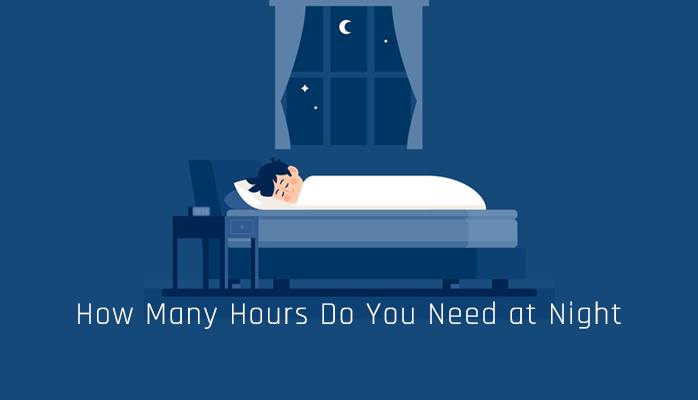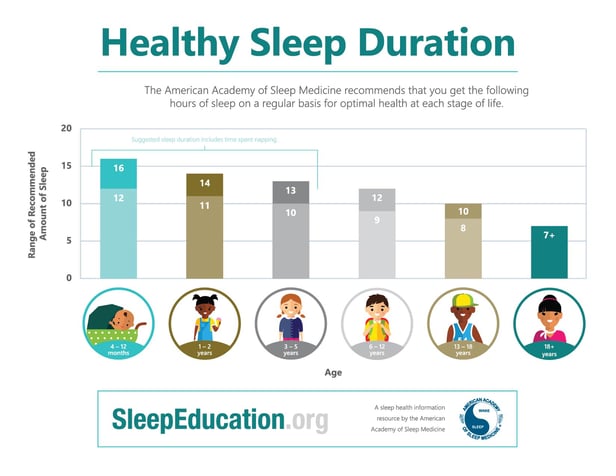Relationship Between and Age
Your age is likely the most important factor in how much sleep you need. Additionally, your sleep pattern and circadian rhythm changes as you get older as well. You likely won’t sleep the same at 10 years old as you will at 20 or even 50 years of age.
Why does this matter? Because sleep deprivation is not always caused because you aren’t sleeping enough at night. You might not be sleeping enough at night, but perhaps you are not napping enough to make up sleep that you cannot get at night because your sleep pattern has changed.
It also goes without saying that you are a unique person with unique work and life circumstances that dramatically affect when and where and how you sleep. Such life factors also need to be taken into account when evaluating whether or not you are sleeping enough.
Let’s look at how much sleep you need based on age.
How Much Sleep Do Babies Need?
Babies need the most amount of sleep of all ages. This involves sleeping a lot throughout the night, and supplementing with several naps throughout the day. Here are guidelines for the minimum, maximum, and “sweet spot” recommended amount of sleep for most babies [Sleep Foundation].
- Age 0-4 months
- Recommended 14-17 hours per day
- Not less than 11 hours
- Not more than 19 hours
- Age 4-12 months
- Recommended 12-16 hours
- Not less than 10 hours
- Not more than 18 hours
Babies can develop sleeping disorders (it’s not uncommon for newborns to have sleep apnea, which usually goes away as they age), that can limit a baby’s ability to meet the minimum or not exceed the maximum sleep recommendations.
How Much Sleep do Adolescents, Children, and Teenagers Need?
As children get older, they need less sleep. You might notice that once your child transitions from being a toddler to being a school-aged child, such around 2-3 years old, they may start to forego naps (much to the lamentation of many parents!) because they can get their full sleep at night. Here are the recommendations [Sleep Foundation]:
- Age 1-3 years
- Recommended 11-14 hours
- Not less than 9 hours
- Not more than 16 hours
- Age 3-5 years
- Recommended 10-13 hours
- Not less than 8 hours
- Not more than 14 hours
- Age 6-13 years
- Recommended 9-12 hours
- Not less than 7 hours
- Not more than 12 hours
- Age 13-18 years
- Recommended 8-10 hours
- Not less than 7 hours
- Not more than 11 hours
How Much Sleep Do Adults Need?
No matter what your friends might say, adults should be getting between 7-9 hours of sleep every night. This recommendation is extensively researched and well understood. Enough sleep does not mean how much sleep you can survive on, but how much you need to thrive. So when your friend says they only need 5 hours sleep, what they are likely really saying is that they can “get by” on 5 hours of sleep.
“Getting by” simply means functioning with sleep deprivation. Sleep deprivation is terrible for your emotional, physical, and mental health. It leads to lower quality of life, lower life expectancy, many medical conditions (such as heart disease and depression), and a less-performant version of yourself.
It’s also important to keep in mind that your sleep pattern changes as you age. Generally speaking, as you get older your sleep may feel less restful during the night, and you may be more inclined to nap. The times that you go to bed and wake up will also likely change. While your pattern might change, your need for getting a certain amount of sleep won’t change.
Signs That Children Are Not Getting Enough Sleep
We are familiar with terms like the “witching hour” when our children get sleepy. The defiant, crabby, and hyperactive behaviors that are characteristic of the witching hour are also similar or the same signs children chronically show when they are suffering from sleep deprivation.
These signs of sleep deprivation in children include:
- Behavior that is consistent with ADHD signs
- Hyperactivity
- Difficulty concentrating
- Defiant behavior
- Impulsive behavior
- Excessive sleep on weekends
- Falling asleep during the day, such as at school
- Poor or erratic performance at school
- Hard time waking up in the morning
Sleep Disorder Causes of Sleep Deprivation in Children and Adults
Sleep disorders are common causes of sleep deprivation in babies, children, teenagers, and adults and can include:
- Sleep apnea
- Insomnia
- Parasomnias
- Circadian rhythm disorders
- Restless leg syndrome (more common in older people)
- Night terrors (more common in children)
If you live in Alaska and you or your child seems to be suffering from sleep deprivation and is not getting much screen time, please access this free online sleep test to get in touch with us.



